Related Research Articles

The 2000 Summer Olympics, officially the Games of the XXVII Olympiad and also known as Sydney 2000, the Millennium Olympic Games or the Games of the New Millennium, was an international multi-sport event held from 15 September to 1 October 2000 in Sydney, New South Wales, Australia. It marked the second time the Summer Olympics were held in Australia, and in the Southern Hemisphere, the first being in Melbourne, in 1956.
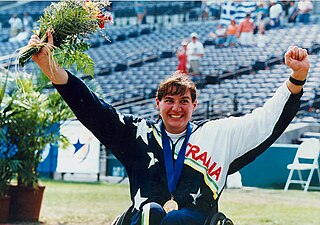
Alix Louise Sauvage, OAM is an Australian paralympic wheelchair racer and leading coach.
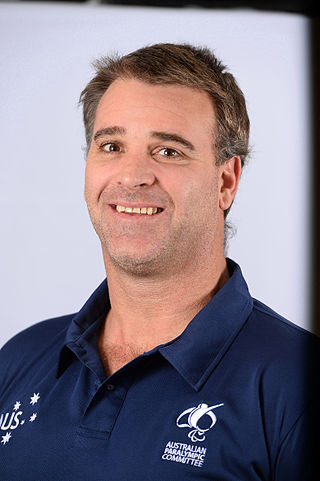
Bradley John Ness, OAM is an Australian wheelchair basketballer. He won a gold medal at the 2008 Beijing and silver medals at 2004 Athens and 2012 London Paralympics. He was selected as the Australian flag bearer at the Opening Ceremony at the 2016 Rio Paralympics.

Priya Naree Cooper, is an Australian world champion disabled swimmer, winning nine Paralympic gold medals as well as world records and world championships. She competed in the Australian swimming team at the 1992, 1996 and 2000 Summer Paralympics with an S8 classification. She was twice the co-captain of the Australian Paralympic team, including at the 2000 Paralympic Games in Sydney, and carried the Australian flag at the closing ceremonies for the 1992 and 1996 Summer Paralympics. Cooper has cerebral palsy and spends much of her time in a wheelchair. She attended university, working on a course in health management. After she ended her competitive Paralympic career, she became a commentator, and covered the swimming events at the 2002 Commonwealth Games.
Paralympics Australia (PA) previously called the Australian Paralympic Committee (APC) (1998–2019) is the National Paralympic Committee in Australia for the Paralympic Games movement. It oversees the preparation and management of Australian teams that participate at the Summer Paralympics and the Winter Paralympics.

Australia competed at the 2012 Summer Paralympics Games in London, United Kingdom, from 29 August to 9 September 2012. The London Games were the biggest Games with 164 nations participating, 19 more than in the 2008 Beijing Paralympic. Australia has participated at every Summer Paralympic Games and hosted the 2000 Sydney Games. As such, the 2000 Sydney Games, regarded as one of the more successful Games, became a point-of-reference and an inspiration in the development of the 2012 London Games.

The 1996 Summer Paralympics were held in the United States city of Atlanta. Australia competed in 13 of the 17 sports, winning medals in 10 of those sports. At the 1996 Summer Paralympics, Australia had the second highest medal tally of any country competing. It won 42 gold, 37 silver and 27 bronze medals. It surpassed the 24 gold medals that Australia won at the 1992 Paralympics. The sports of athletics, swimming and cycling provided Australia with the majority of its medals.

Australia competed at the 2004 Summer Paralympics in Athens, Greece. It was Australia's 12th year of participation at the Paralympics. The team included 151 athletes. Australian competitors won 101 medals to finish fifth in the gold medal table and second on the total medal table. Australia competed in 12 sports and won medals in 8 sports. The Chef de Mission was Paul Bird. The Australian team was smaller than the Sydney Games due to a strict selection policy related to the athletes' potential to win a medal and the International Paralympic Committee's decision to remove events for athletes with an intellectual disability from the Games due to issues of cheating at the Sydney Games. This was due to a cheating scandal with the Spanish intellectually disabled basketball team in the 2000 Summer Paralympics where it was later discovered that only two players actually had intellectual disabilities. The IPC decision resulted in leading Australian athletes such as Siobhan Paton and Lisa Llorens not being able to defend their Paralympic titles. The 2000 summer paralympic games hosted in Sydney Australia proved to be a milestone for the Australian team as they finished first on the medal tally for the first time in history. In comparing Australia's 2000 Paralympic performance and their 2004 performance, it is suggested that having a home advantage might affect performance.

Amanda Carter is an Australian Paralympic wheelchair basketball player. Diagnosed with transverse myelitis at the age of 24, she began playing wheelchair basketball in 1991 and participated in the Australia women's national wheelchair basketball team, the Gliders, at three Paralympics from 1992 to 2000. An injury in 2000 forced her to withdraw from the sport, but she came back to the national team in 2009, and was a member of the team that represented Australia and won silver at the 2012 London Paralympics.
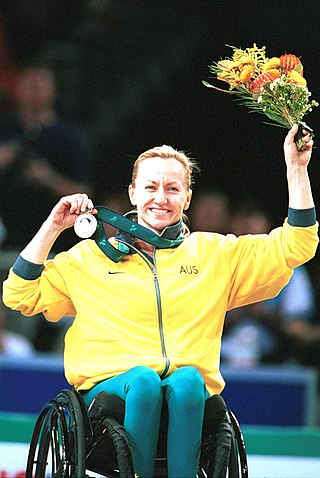
Donna Ritchie (born 28 December 1963 in Manly, New South Wales is a wheelchair basketball player from Australia. She was part of the silver medal-winning Australia women's national wheelchair basketball team at the 2000 Summer Paralympics.

David Ian Gould, is an Australian wheelchair basketball player and coach.

Also known as the 13th Stoke Mandeville Games, the 1964 Summer Paralympics was the 2nd Paralympic Games. Hosted in Tokyo, the games ran from 8 to 12 November. Australia won a total of 30 medals and finished fourth on the medal tally behind Italy (3rd), Great Britain (2nd) and the United States (1st). Australia competed in 6 of the 9 sports at the Games, winning medals in each of those sports, but was most successful in the pool, winning a majority of their medals in swimming events.
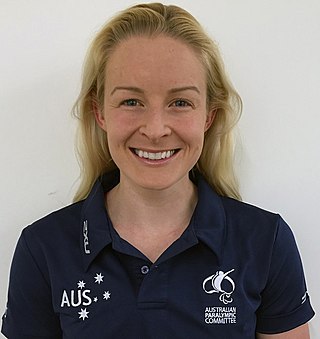
Jessica Gallagher is an Australian Paralympic alpine skier, track and field athlete, tandem cyclist and rower. She was Australia's second female Winter Paralympian, and the first Australian woman to win a medal at the Winter Paralympics at the 2010 Vancouver Games. She competed at the 2014 Winter Paralympics in Sochi, where she won a bronze medal in the Women's Giant Slalom Visually Impaired.

Christopher John Nunn, OAM is an Australian athletics coach. He was the head coach of the Australian athletics team at the 2000 Sydney Paralympics.

Michael Roeger is an Australian T46 athletics competitor. He competed at the 2008, 2012, and 2016 and 2020 Summer Paralympics athletics in middle distance and marathon running events. He has won one gold and three bronze medals at the IPC Athletics World Championships and a bronze medal at the 2016 Rio Paralympics. His gold in the Men's T46 marathon at the 2019 World Para Athletics Championships was held as part of the London Marathon, set a new world record.

Carol Lynn Cooke, is a Canadian-born Australian cyclist, swimmer and rower. A keen swimmer, she was part of the Canadian national swimming team and was hoping to be selected for the 1980 Moscow Olympics before her country boycotted the games. She moved to Australia in 1994, was diagnosed with multiple sclerosis in 1998, and took up rowing in 2006, in which she narrowly missed out on being part of the 2008 Beijing Paralympics. She then switched to cycling, where she won a gold medal at the 2012 London Paralympics, two gold medals at the 2016 Rio de Janeiro Paralympics and a silver medal at the 2020 Tokyo Paralympics.

Erik Horrie is an Australian wheelchair basketball player and a five-time world champion rower. He was a member of the Australia men's national wheelchair basketball team. Switching to rowing in 2011, he made an immediate impact in the sport, first winning the NSW State Rowing Championships and then the National Rowing Championships in Adelaide. He has won silver medals at the 2012, 2016, 2020 Summer Paralympics and gold medals at the 2013, 2014, 2015, 2017 and 2018 World Rowing Championships.

Kathleen Margaret "Katie" Kelly is an Australian paratriathlete, who has a degenerative disease known as Usher syndrome. Kelly began competing in the PT5 paratriathlon classification in February 2015 when her condition deteriorated to a legally blind state. She has just 30 per cent of her vision. With her guide Michellie Jones, Kelly won gold medals at the 2015 and 2017 ITU World Championships and 2016 Rio Paralympics. She competed at the 2020 Summer Paralympics.

Brant Garvey is an Australian leg amputee paratriathlete. He represented Australia at the 2016 Rio Paralympics when paratriathlon made its debut at the Paralympics.
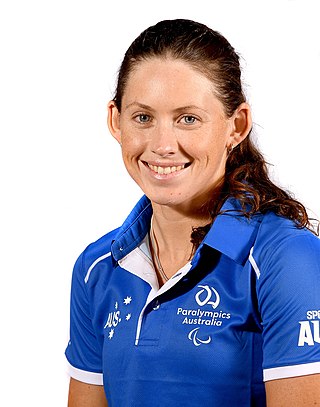
Lauren Parker is an Australian paratriathlete. She won a silver medal at the 2020 Summer Paralympics.
References
- ↑ "Club History". Southern Tigers Basketball Association Website. Archived from the original on 3 September 2012. Retrieved 25 May 2012.
- ↑ Australian Olympic Team - 1984 Los Angeles. Australian Olympic Federation. 1984.
- ↑ "Australian Institute of Sport Annual Report" (PDF). Archived from the original (PDF) on 31 March 2012. Retrieved 25 May 2012.
{{cite journal}}: Cite journal requires|journal=(help) - ↑ "Bowled over by the men from Del Monte". TES Magazine Website. Archived from the original on 21 April 2013. Retrieved 25 May 2012.
- ↑ "Australian Paralympic Committee Annual Report" (PDF). 1999. Retrieved 25 May 2012.
{{cite journal}}: Cite journal requires|journal=(help)[ permanent dead link ] - ↑ Peatling, Stephanie (12 March 2001). "Australians Caught Up In New Paralympics Uproar". Sydney Morning Herald. Archived from the original on 25 April 2012. Retrieved 20 October 2011.
- ↑ "Odyssey House Staff". Odyssey House Website. Retrieved 25 May 2012.
- ↑ "Contact Us". Triathlon Australia Website. Archived from the original on 2 May 2012. Retrieved 28 May 2012.